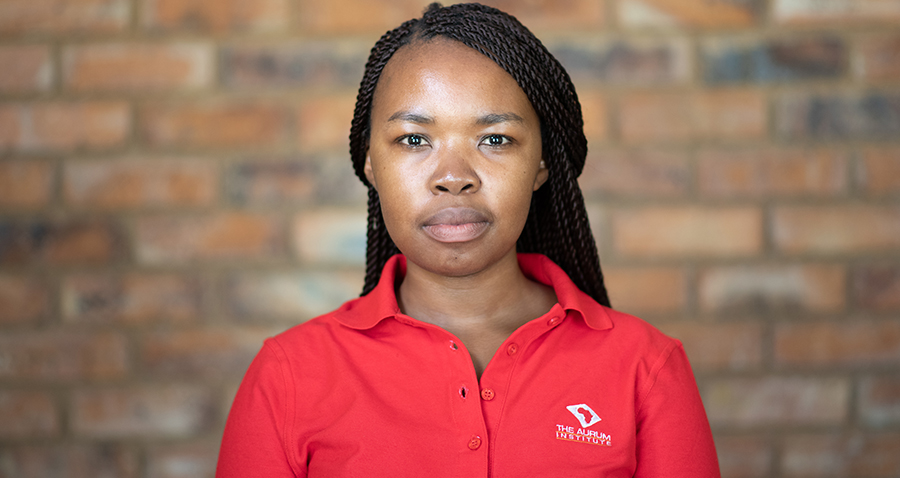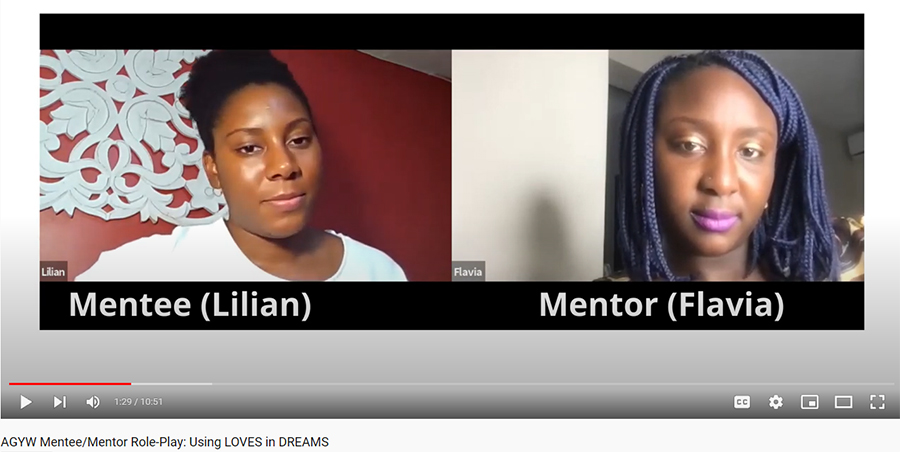CDC Virtual Training Prepares Mentors and Peer Educators to Respond to Disclosures of Violence
Summary
- CDC’s LOVES training teaches mentors how to provide first-line response for survivors of violence and stands for Listen, Ongoing connection, Validate, Encourage safety, and Support.
- Mentors and peer educators serve as confidants to program participants, assist them in building positive relationships within their support networks, and provide active linkages to services in their communities.
- In 2021, CDC piloted two trainings to support DREAMS mentors and peer educators responding to disclosures of violence.
Mary mentors adolescent girls and young women (AGYW) in her community through the DREAMS (Determined, Resilient, Empowered, AIDS-free, Mentored, Safe) program. After wrapping up a session on preventing HIV in a DREAMS safe space, one of the young women, Rose, stays to talk with her. Rose shares that a neighbor, an older man, follows her and makes her feel unsafe. Mary listens and validates Rose’s fears by telling her she believes her and that what her neighbor is doing is not okay. Mary provides tips on how Rose can try to stay safe and they discuss having a social worker visit Rose’s home to speak with her parents to develop solutions. Mary is glad she received the Centers for Disease Control and Prevention’s (CDC) LOVES training on responding to concerns of violence and is now able to support young women who ask for her help. LOVES stands for Listen, Ongoing connection, Validate, Encourage safety, and Support.

Mary mentors adolescent girls and young women in her community through the DREAMS program. Photo by Thom Pierce 2018
Mentors and peer educators play a critical role in the President’s Emergency Plan for AIDS Relief (PEPFAR) program. Similar to navigators for HIV care and treatment, peers support key populations, and mentor mothers for maternal and child health. They often serve as confidants to program participants, assist them in building positive relationships within their support networks, and provide active linkages to services in their communities. AGYW in mentor-based programs may feel safe disclosing their fear of or experiences with physical, emotional, or sexual violence. As a result, program mentors and peer educators must be prepared to respond appropriately to disclosures of violence.
LOVES takes care of mentors and mentees
In 2021, CDC’s Global HIV Prevention Branch, Gender and Youth Team piloted two trainings to support DREAMS mentors and peer educators responding to disclosures of violence from AGYW participants. Using the World Health Organization’s (WHO) approach for first-line support in clinical settings, LIVES, the new adaptation, called the LOVES Virtual Training Program, seeks to capitalize on mentorship’s unique role and assets in preparing individuals to respond to disclosures of violence.

From the LIVES approach, this new framework replaces the “I” for Inquire to “O” for Ongoing connection. The LOVES framework shifts the focus from a one-time offer of help in a clinical setting. Instead, it focuses on the strength of the mentor and mentee relationship and on how the mentor can provide emotional closeness and ongoing support, including linkage to needed referral services. The second change is from “Enhance safety” to “Encourage safety.” This adjustment considers the potential safety concerns of mentors responding to violence among their peers and what is reasonably within their control with the support of their implementing partner organization.

LOVES Virtual Training Program Mentor-Mentee Roleplay Video.
The LOVES Virtual Training Program builds skills to appropriately respond to AGYW who disclose experiences or fears of violence during mentor programs. In contrast to formal mental health training required to be a caseworker or counselor, the LOVES Virtual Training prepares individuals to provide an immediate, empathetic response to trauma. The training also enables connection to necessary services and support. In addition to skills-building, partners implementing the LOVES Virtual Training Program learn how to formally present each training component to their mentors and peer educators. The LOVES training package includes pre-recorded training materials and videos and three live interactive virtual sessions that focus on practicing using LOVES.
Mentors and peer supporters are invaluable to CDC’s efforts to end gender-based violence. However, they are often limited in their capacity to address issues related to violence and trauma among near-age peers. The LOVES training builds skills relevant to their specific roles and responsibilities, focusing on responding to disclosures over actively finding cases of violence. The LOVES Virtual Training Program recognizes the potential for secondary trauma and burnout among mentors and peer supporters and includes a focus on safety and self-care. It assists mentors in identifying personal strategies for self-care. Supporting mentors with the tools they need to succeed is a critical component of addressing violence and HIV in the communities they serve.
WHO: Responding to intimate partner violence and sexual violence against women: WHO clinical and policy guidelines (2013).
WHO: Health care for women subjected to intimate partner violence or sexual violence: clinical handbook (2014).
Responding to Children and Adolescents Who Have Been Sexually Abused (2017).